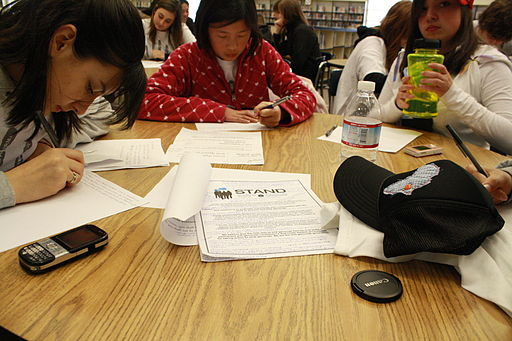- Subject:
- English Language Arts, Reading Literature
- Material Type:
- Lesson Plan
- Level:
- High School
- Grade:
- 11
- Provider:
- Pearson
- Tags:
- License:
- Creative Commons Attribution Non-Commercial
- Language:
- English
Small Group Analysis

Overview
In this lesson, students will work in small writing groups to improve their literary analysis essay.
Preparation
- Read the lesson and student content.
- Anticipate student difficulties and identify the differentiation options you will choose for working with your students.
- Decide how you will put students in writing groups, and plan whether you will include time for individual conferences with you during class.
- Determine whether you will display the writing group protocol for the class and, if so, how you will do it.
Essay Reflection
- Encourage students to consider how they can apply what they know about themselves to write a successful paper.
- ELL: If time permits, it can be helpful to have students share their thoughts from the Quick Write and capture responses on the board for reference.
- Students finished the first essay in this unit in Lesson 12, Task 4.
- If you wish, let students know how to submit this writing to you.
Opening
Think back to the short essays you wrote on “The Wife of His Youth” and “A Warrior’s Daughter.”
Complete a Quick Write on the following questions.
- What did you learn about yourself as a writer and thinker from that essay?
- How can you apply those lessons to the longer paper you are working on now?
Open Notebook
Group Process Review
- Put students in small groups for peer feedback.
- Remind students about providing positive yet honest feedback during critique.
- SWD: Model providing feedback, both through content (what words students can use) and through process (how can students sandwich critical feedback with positive feedback). Provide sentence frames on the board for students who need more support in giving helpful feedback.
- If feasible, display the writing group protocol as students work.
- Make sure students understand the process before moving on to the next task.
Work Time
You will be working again in small writing groups and you will follow the same protocol as you did for your short paper in Episode 2.
- One group member, the writer, reads his or her own paper aloud.
- Other group members take notes or write down comments and questions without interruption.
- Group members share comments and questions, focusing on how the writer could achieve a top score on the rubric. The writer notes group members’ ideas but does not respond until everyone has shared.
- The writer responds and asks question about the group members’ comments.
- The group repeats the process for each group member.
Essay Feedback
- Review the Informational Writing Rubric with your students.
- Many students will rush through the review process. Be sure to circulate among the groups and ask your own questions to further the sharing and discussion.
- Continue to display the writing group protocol guidelines for reference while student work.
- Let students know how to share feedback with one another.
Work Time
In your groups, share your literary analysis papers by following the writing group protocol.
- Review the Grade 11 Informational Writing Rubric.
- Follow the writing group protocol.
- Use the rubric as a tool to locate strengths and weaknesses in your peers’ papers.
Final Essay Planning
- If appropriate, have two or three students share their plan with the whole class.
- Let students know if you want them to submit their plan to you.
- SWD: This will be the final in-class opportunity to check in with students. Be sure to touch base with those who are still having difficulties with longer writing assignments.
Closing
Respond to the following question.
- What feedback from today’s lesson will you incorporate into your essay?
- What will be the focus of your work as you finish the essay?
Open Notebook
Literary Analysis Essay
- Encourage students to seek out extra help or to conference with you outside of class.
- Let students know how they will submit their essays and Independent Reading Journals to you during the next lesson.
- Explain what “polish” means, if students are not clear about what final steps to take (incorporating feedback, proofreading, etc.).
- Remind students to prepare for the presentation. Student presentations should be brief but informative. They should not read their papers completely, but give their classmates an overview of their ideas and the evidence they supplied to support those ideas.
- ELL: Encourage students to practice in pairs or small groups before the full-class presentation. Have them create note cards or an outline to use during their presentation.
Homework
- Polish your literary analysis paper, as you will submit it to your teacher in the next lesson.
- Plan to give a 1- to 2-minute presentation to the class.
Reminder: Your Independent Reading Journal is also due in the next lesson.